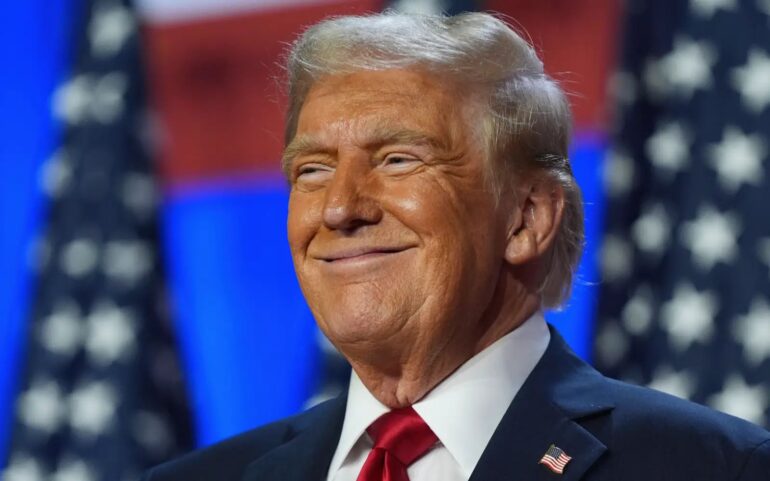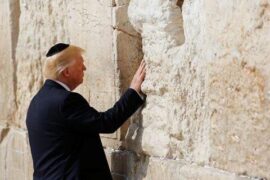The US-Israel relationship has always been unhealthy and abusive. Despite the narrative of “shared values” and some “unbreakable” alliance, the contradictions between US and Israeli interests are too big to be kept hidden from sight.
The 1956-57 Sinai Crisis, 1975 Reassessment Crisis, and 1991-92 Loan Crisis in particular stand out as examples where the veil was lifted. But President Donald Trump was seen as different by many nationalist Jews, even by many of those who in most cases recognize the inherently problematic nature of the US-Israel relationship.
Trump presented himself as the “most pro-Israel American president.” He was the mover of the embassy, the initiator of the Abraham Accords, the would-be King Cyrus of the modern era!
The reality is that Israel by 2017 was a far stronger and more independent country than during previous crises with Washington. Israel had become firmly recognized as a developed economy – a distinction cemented by its 2010 ascension to the OECD – and could no longer be simply muscled back into submission with threats of economic sanctions, diplomatic realignment, or withheld loans as Trump’s Republican predecessors Dwight D. Eisenhower, Gerald Ford, and George H.W. Bush had. To rebuild the US-Israel relationship after President Barack Obama and the Iran Deal, Washington would have to relate to Israel less as a vassal to be lorded over and more of a client to be won.
Trump, to his credit, recognized this new reality of Israel’s economic power, independence, and dignity. In his first term Trump made several (largely symbolic) gestures to rebuild the US-Israel relationship after eight years of Obama; moving the US Embassy to Jerusalem, recognizing Israeli sovereignty over the Golan Heights, defunding UNRWA, pulling the US out of the Iran Deal, and providing the concessions necessary for several Arab states to ink formal diplomatic relations with Israel after years of semi-secretive cooperation.
These gestures were no charity, they were a dowry, and for it President Trump duly expected Israel’s hand in his “Deal of the Century” for a Palestinian state in Gaza and the West Bank, the endgame of every US administration since the Six Day War (and arguably before).
Trump is now preparing to enter the White House again in a starkly similar situation with Israel to 2017.
The Biden administration, which has unabashedly and habitually interfered with Israel’s domestic politics while attempting to micromanage our current war, has brought the US-Israel relationship to a new low. One could hope that Trump understands that Israel, even stronger and more autonomous now than in 2017, will not be strong-armed back into place, and that he must again deliver good will gestures to rebuild this relationship.
Beyond the symbolic political signaling of his recent appointments, Trump might once again defund UNRWA, relax American demands in Israel’s war,return sanctions against Iran, and even recognize Israeli sovereignty over parts of Judea and Samaria. He might even green light an Israeli strike on Iran’s nuclear and oil infrastructure (although it should be asked why we accept a situation in which Israel believes we need such permission). But none of this will come without a cost.
Each gesture to Israel Trump makes will come attached with the expectation of Israeli reciprocation and support for Trump’s inevitable new program to divide our land into two separate states – each dependent on the US empire for survival.
With Trump there is both an opportunity and a challenge. The opportunity is in Trump’s reconciliatory gestures, the possibility within to strike a serious blow against the Iranian Axis and possibly even to cement Israel’s territorial integrity. The challenge is resisting Trump’s eventual price, resisting Washington’s recurring projects for partitioning our land, and resisting the domestic agents Trump might recruit and activate to his political ends.
In fact, Trump transition officials have reportedly already announced that the president’s “Deal of the Century” is “back on the table.”
Every gesture Trump makes towards Israel should be recognized as an opportunity and taken for full advantage. At the same time, Trump and all his actions must be viewed with constant vigilance and suspicion. Donald Trump is not our friend. Trump is the leader of the global hegemon whose imperialist interests in the short term demand reconciliation with Israel, but in the long term require the partition of our land and the erosion of our sovereignty.
This was the path taken by Prime Minister Netanyahu during Trump’s first term, even at the presentation of the “Deal of the Century” where he graciously accepted American recognition of Israel’s right to sovereignty over parts of the West Bank while quietly resisting designs for territorial concessions. Through local proxies like Yisrael Beiteinu leader Avigdor Lieberman, Trump destabilized Israel’s political system for three years and five election cycles in an attempt to achieve a coalition that would accept the Trump plan. This instability was the foundation of the 2019-22 Democratic Crisis.
The opportunities presented by any good will gestures from Trump must be fully seized, while Trump himself must never be underestimated or blindly trusted. If his administration does in fact create the conditions for Israel to advance our interests, we must do so boldly and quickly, despite the fact that advancing our interests with an American green light already exposes a deep weakness in Israel and emphasizes the deep need for our psychological liberation.
Regardless of the Trump administration’s policies or how beneficial they appear to Israel on the surface, Jerusalem cannot allow a regression to a position of submission to the United States. Our leaders must continue to work towards becoming fully independent from Washington. In the interim, however, this crucial line between grace and vigilance will be necessary to walk. Each step forward must not be a blind run but a cautious march with full understanding of the different interests at play.





